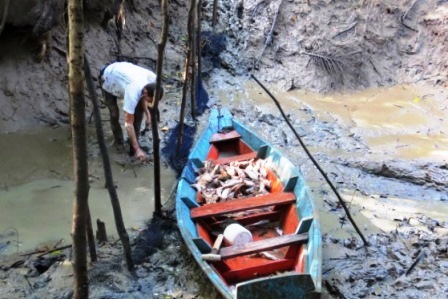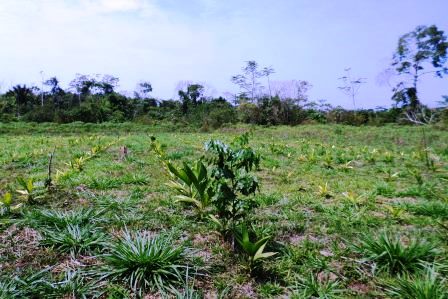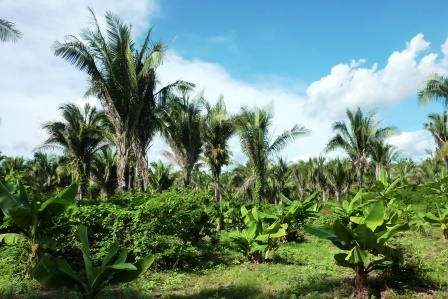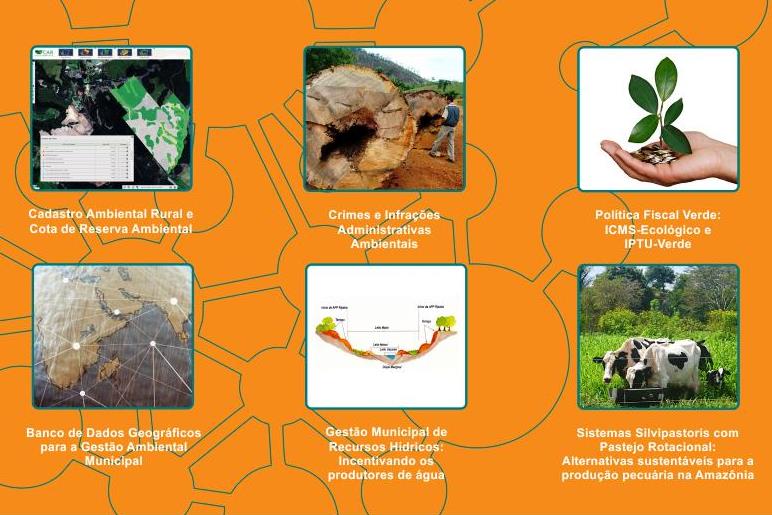ACTIVITIES CONDUCTED
The Community Forests project was organized into three components, namely: (i) Preparation for community forest management; (ii) Implementation of community forest management; and (iii) Communication and dissemination of project results. The following is a brief description of the activities developed by the project in these three components.
It should be noted that, with the impact of the COVID-19 pandemic, some of the actions foreseen in the project were impacted, but without prejudice to the purpose or results of the project.
Component 1 had as its main purpose the preparation of the community for the implementation of community and family forest management in the area covered by the project, through the creation and strengthening of cooperatives, the training of residents of the Resex and the preparation of the necessary documents for approval of forest management.
In 2017, the Community Forests Caravan was carried out in the three Resex in order to raise awareness of the project. We carried out (i) the presentation of the project to residents of Resex and interested parties; (ii) the awareness of traditional populations for community forest management and the importance of strengthening community organizations; and (iii) the presentation of the actors involved in the project strategy.
In this process of dialogue and validation of the project strategy, it was possible to gather important information about community organizations and the value chains of açaí and timber. The Caravan mobilized 1,035 beneficiaries and produced the document "Ground Zero Diagnosis of the Açaí and Timber Production Chains of the Marajó Resex", which subsidized the other actions of the project.
Through the project, two cooperatives were created, and a cooperative that was already created was strengthened. At Resex Arióca Pruanã, the Agroextractive Mixed Cooperative of Resex Arióca Pruanã was created, which also had its internal regulations prepared. At Resex Terra Grande Pracuúba, the Agroextractive Cooperative of Resex Terra Grande Pracuúba – Agronatu was created. At Resex Mapuá, whose cooperative was already established at the beginning of the project, its internal regulations were prepared and its strategic planning was developed.
The project worked on training in administrative and financial management of community organizations. They participated in the workshops of "Administrative and Financial Management", the boards of the Associations: i) Amoreap (Association of residents of Resex Arióca Pruanã); ii) Cooprunã (Cooperative of Resex Arióca Pruanã); iii) Coama (Cooperative of residents of the Aramã and Mapuá rivers); and iv) Amoretgrap (Association of Residents of Resex Terra Grande Pracuúba). During the workshops, 26 people were trained (21 men and 5 women), all members of the boards of these organizations.
In relation to forest management, several courses were held on açai palm management, good harvesting practices, marketing and others, in addition to courses focused on low-impact timber management, totaling 2,250 people trained in some activity related to timber and/or açai palm forest management. In addition, about 1,700 hectares of productive forests for community forest management were inventoried in the Resex Mapuá and Arióca Pruanã, which provided two forest harvests throughout the project.
Six business plans were prepared, three for the timber production chain and three for the açaí production chain. These documents are used by community organizations in improving production processes and planning the harvests of these products. Two Sustainable Forest Management Plans (PMFS) were prepared and approved for Resex Mapuá and Arióca Pruanã, these plans are valid for 10 and 25 years. With the valid PMFS, the Annual Operational Plans (POA) are made to enable the sustainable exploitation of native timber.
Component 2 aimed at the implementation of the prepared Forest Management Plans, through the acquisition of equipment and materials, installation of infrastructures for the transport of forest products and technical assistance to monitor the activities and guide the cooperative members.
The implementation of forest management was carried out in two Annual Production Units (UPA), one in Mapuá and another in Arióca Pruanã, totaling an area of 660 hectares of forests managed in the first harvest licensed in these units. The technical monitoring was carried out by IFT throughout the years 2020, 2021 and 2022, both for açaí and timber. Forest management in Resex Mapuá resulted in the commercialization of about 1,500 m³ of timber. At Resex Arióca Pruanã, whose timber production was estimated at about 5,200 m³, it was expected that the commercialization would be carried out at the end of 2022, after the last monitoring of the project by the BNDES.
The support for the preparation of contracts and commercialization of forest products made it possible to enter into two timber marketing contracts signed in 2020, one in Resex Mapuá by the Cooperative of producers of the Mapuá and Aramã Rivers (Coama), and another in Resex Arióca Pruanã by the Association of residents of Resex Arióca Pruanã (Amoreap). At the end of the whole commercialization process, the estimated revenue from the sale of the timber production in the two units is about R$2 million, being about R$500,000 for the Mapuá Resex and about R$1.5 million for the Arióca Pruanã Resex. For the açaí harvest, Coama signed a contract to sell the product, with the commercialization of a little more than 11,000 cans.
During the execution of the project, some adjustments were made, as in the case of the communities of Resex Terra Grande Pracuúba (TGP), which decided not to carry out forest management for the production of timber, so that the actions planned for this territory were redirected to other territories or replaced by other activities.
Component 3 provided for communication and dissemination of information. Throughout the execution of the project, there was an exchange on community forest management initiatives in the Amazon region, which included the participation of extractive communities from three Amazonian states (Acre, Amazonas and Pará), including the Marajó Resex. Due to the COVID-19 pandemic, there were no press visits to the Resex, however, several stories about the actions of the project were published in the local press.
Several publications were launched throughout the execution of the project, such as the booklet “Agroextractive Cooperatives: step-by-step guide to the creation of a community business”, technical newsletters on “100% Forest Inventory and Vine Clipping”, “Planning and Construction of Infrastructures, roads and storage yards”, “Special techniques for cutting trees and safety at work”, “Practical Guide for Preparing Simplified Forest Inventory”, and others.
A documentary on community forest management in the Resex covered by the project was released in October 2022. The documentary is on IFT's youtube channel (https://www.youtube.com/watch?v=X0RqkxHtIE4).








